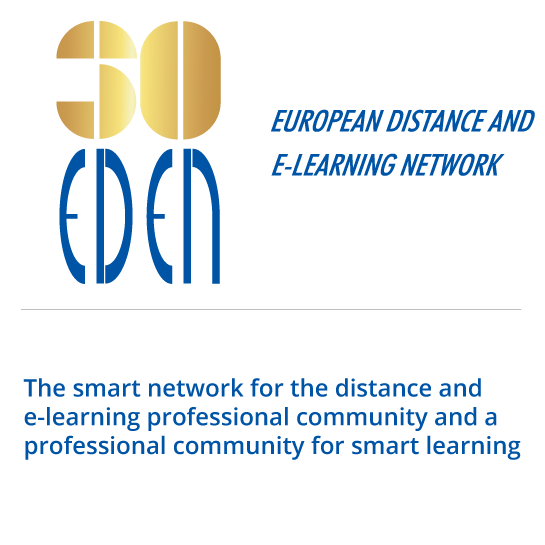- Plenary Session 1
- Coffee Break
- Parallel Sessions A
- Lunch
09:00 – 11:00 Plenary Session 1
Chair: Blazenka Divjak, Vice-Rector for Students and Studies at the University of Zagreb and António Moreira Teixeira, President of EDEN
-
Conference Welcome Addresses:
-
António Moreira Teixeira, President of EDEN
Aleksa Bjeli, Rector of the University of Zagreb
Milan Bandiæ, Mayor of Zagreb
Ivo Josipovic, President of the Republic of Croatia
Keynote speeches:
- E-learning and Employability Shift Focus on Learning (Again)
Blazenka Divjak, Vice Rector for Students and Studies at the University of Zagreb, Croatia
- Digital Education & Lifelong Learning
Jeff Haywood, Vice-principal, Knowledge Management at University of Edinburgh, United Kingdom
11:00 – 11:30 Coffee Break
11:30 – 13:00 Parallel Sessions A
Session A1
Work Based Learning: Concepts and Models
Chair: Deborah Arnold, University of Burgundy, France
- Work in the Future is Continuous Learning
- Ari-Matti Auvinen, HCI Productions Ltd., Finland
- ICT Supported Work-Based Conflict Resolution Learning
- Alan Bruce, Universal Learning Systems, Ireland, Maria Antonia Guardiola Lopez, Universitat Oberta de Catalunya – UOC, Spain
- Is the Openness a Problem in Open Workplace-Based Training?
- Ulf Olsson, Stockholm University, Olle Vogel, The Knowledge Foundation, Sweden
- Virtual Practical Training in Engineering Fields
- Diana Andone, Radu Vasiu, Mihai Onita, Politehnica University of Timisoara, Romania
Session A2
The MOOCs OERs Landscape
Chair: Lisa Marie Blaschke, Carl von Ossietzky University of Oldenburg, Germany
- Evaluating MOOCs – What is Really Happening?
- Grainne Conole, University of Leicester, United Kingdom
- Lets Look into the Future! E-Learning Trends and Hypes in Academic Teaching
- Helge Fischer, Linda Heise, Matthias Heinz, Kathrin Moebius, Thomas Kohler, Dresden University of Technology, Germany
-
How can e-Learning and MOOCs Reveal and Exploit the Hidden Treasures of Open Research and Open Education?
- Christian M. Stracke, University of Duisburg-Essen – UDE, Germany
- Open Learning Arenas with an Open Culture of Sharing Success Factors
- Ebba Ossiannilsson, Lund University, Sweden
Synergy Session A3
Synergy Fairground 1
The Synergy Strand facilitates the sharing of project outputs and research findings, offer the participants platform to develop new ideas and plans, to create new partnerships by engaging them in interactive working group activities.
To maximise the potential for effective collaboration the “Synergy Fairground” sessions aim to provide a platform for short presentations to allow the conference audience to familiarise themselves with the participating initiatives. Later on (Thursday and Friday on the 12th and 13th of June) during 4 dedicated thematic “Working Group” sessions these same projects’ promoters can discuss overlaps and synergies between their and their peers’ initiatives and talk and interact with each other at will.
Presented projects in this session:
DigiSkills, TRANSIt, UDLnet , HANDSON, PEEP, MEDEAnet, ISE, LACE, EMMA, LIBE, eLene2learn, POERUP, ODS, STAY IN, ARMAZEG, HoTEL, eMundus, VISIR, JAMTODAY, CAMELOT, SoMeCat, GRASS and iPro
Workshop Session A4
-
Join the VM-Pass Living Lab
- Anthony F. Camilleri, European Foundation for Quality in eLearning – EFQUEL, Belgium, Grainne Conole, University of Leicester, United Kingdom, Anne Christine Tannhauser, European Foundation for Quality in eLearning – EFQUEL, Belgium, Airina Volungeviciene, Vytautas Magnus University, Lithuania, Denes Zarka, EDEN, United Kingdom, Cristina Stefanelli, MENON Network EEIG, Belgium
Today’s learners are increasingly taking advantage of more flexible and non-formal learning opportunities through a variety of Open Educational Practices (OEP). However, there is usually no formal link with the institution, and achievements may not be accepted elsewhere, restricting learner mobility. Furthermore, for many people formal higher education remains unaffordable and inaccessible. The VM-Pass project’s mission is to give non-formal learning achievements meaning within the formal education system by creating an innovative “learning passport” a standard template where non-formal learning and assessment can be documented such that it may count as qualification for higher education.
The workshop will start with a short introduction on the concept of “unbundled learning” and present some real cases of recognition of open learning. Subsequently, the Learning Passport, a transparency and recognition tool for open educational resources, is introduced, and interactive sessions in small groups organised will give participants the chance to explore the instrument.
Workshop Session A5
-
Support to Early Educators to Face Contemporary Issues: Media Education and Values
- Eva Szalma, EDEN, United Kingdom, Begona Arenas Romero, SCIENTER, Spain, Laura Fedeli, Macerata University, Italy, Elvira Sanchez-Igual, World Association of Early Childhood Educators – AMEI-WAECE, Spain, Pier Giacomo Sola, Amitie srl, Italy, Vojko Strahovnik, University of Ljubljana, Slovenia, Bruno Curko, Association Petit Philosophy, Croatia
The joint workshop of the NEST (Network of Staff and Teachers in Childcare Services) and the ETHOS (Ethical education primary and pre-primary schools for a sustainable and dialogic future) projects promotes the better understanding of the learning needs, resources and support for the Early Childhood Education and Care (ECEC) field. The workshop pinpoints two contemporary issues that professionals working with 0-6 aged children face: digital media education and values education. The workshop gives a recital of main issues in the different national working groups (from Finland to Greece), as well as the trials and tribulations of the partnership in forming an online community with professionals that are in very different level of ICT maturity. The interactive part will be divided between digital media education and values education and participants will be invited to search and identify solutions to the questions and issues presented from a problem solving approach.

